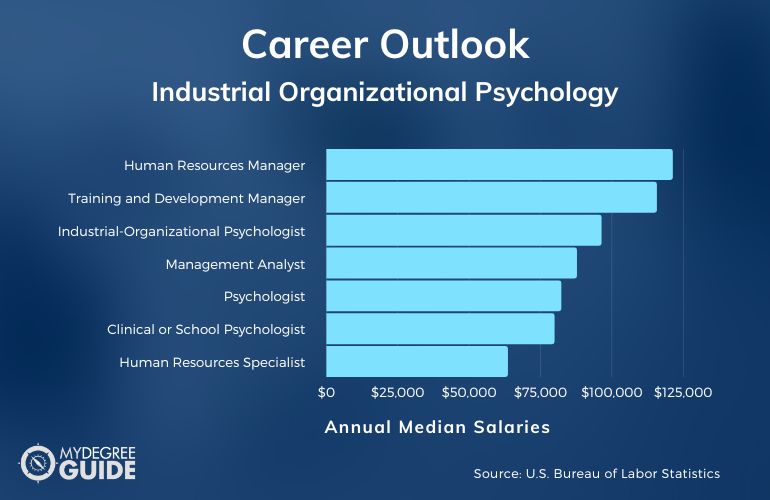If you’re intrigued by how people think and behave, then you may consider pursuing an industrial organizational psychology degree.

You may learn how to apply psychological principles in workplaces to produce results that keep both employees and managers satisfied.
Editorial Listing ShortCode:
I-O psychology may be a good fit for you if you’re interested in business or leadership along with psychology. An online bachelors degree in industrial organizational psychology can set you on the path toward this fascinating career.
Universities Offering Online Bachelor’s in Industrial Organizational Psychology Degree Programs
Methodology: The following school list is in alphabetical order. To be included, a college or university must be regionally accredited and offer degree programs online or in a hybrid format.
Colorado State University
Students enrolled in the Bachelor of Science in Psychology program at Colorado State University will learn valuable skills such as critical thinking, cooperation and teamwork, and analytical thinking as well as oral and written communication skills. Popular course topics include social, industrial, biological, organizational, and cognitive psychology and psychological measurement and testing.
Colorado State is accredited by the Higher Learning Commission.
Concordia University – Irvine
Concordia University—Irvine offers a BS in Organizational Psychology. This fully online degree program focuses on how to apply psychology principles in workplace settings. Each course is 7 weeks long. The curriculum consists of classes such as Business Ethics, Employee Motivation and Attitude Theory, and Measurement of Human Performance.
Concordia University – Irvine is accredited by the WASC Senior College and University Commission.
Florida Institute of Technology
Florida Institute of Technology allows students to pursue Bachelor of Arts or Bachelor of Science degrees in psychology. Students also have several concentration options from which to choose, including one in organizational and industrial psychology. The program is for students wanting careers in management, human resources, business law, or substance abuse.
Florida Institute of Technology is accredited by the Southern Association of Colleges and Schools Commission on Colleges.
Liberty University
The industrial organization psychology program at Liberty University usually takes about 4 years for students to complete, but they can transfer up to 75% of the required 120 credits from a previously attended university to shorten the timeline. Courses include group dynamics, consumer psychology, organizational behavior, and experimental design in research.
Liberty University is accredited by the Southern Association of Colleges and Schools Commission on Colleges.
Louisiana State University
The Bachelor of Science in Psychology program at Louisiana State University features a concentration in industrial and organizational psychology. It’s a good program for students hoping to become human resources specialists, recruiters, compliance coordinators, or training specialists or managers. Major-related courses include developmental psychology, tests and measurement, and personality psychology.
Louisiana State University is accredited by the Southern Association of Colleges and Schools Commission on Colleges.
Post University
Students in Post University’s Bachelor of Arts in Psychology program can choose between three concentration options: applied behavior analysis, human development, education, and health, and industrial and organizational psychology. The industrial and organizational psychology concentration provides students with firm foundations in psychological principles as they relate to interactions within business settings.
Post University is accredited by the New England Commission of Higher Education.
Purdue University
Students in the industrial and organizational psychology bachelors program from Purdue University will take a series of 10 week classes that require them to invest about 15 to 18 hours each week. The school also features an accelerated bachelors to masters program for students who hope to continue their education in graduate school.
Purdue University is accredited by the Higher Learning Commission of the North Central Association of Colleges and Schools.
Southern New Hampshire University
Southern New Hampshire University’s business psychology bachelors program features a concentration in industrial and organizational psychology. It requires 120 credits for graduation, but students can transfer up to 90 into the program. The curriculum includes a unique blend of business and psychology courses to teach students to influence organizational change.
Southern New Hampshire University is accredited by the New England Commission of Higher Education.
Touro University Worldwide
The Bachelor of Arts in Psychology program at Touro University Worldwide includes a concentration in industrial and organizational psychology that’s offered 100% online via a self-paced, flexible learning format. The program is affordable and provides students with the critical thinking, communication, and problem-solving skills needed to find careers in various occupational settings.
Touro University Worldwide is accredited by the WASC Senior College and University Commission.
University of Massachusetts – Global
The University of Massachusetts Global offers a Bachelor of Arts in Psychology program with an optional concentration in industrial and organizational psychology. The program is specifically designed for students hoping to apply psychological principles to the business world. Students learn about diversity issues and training, personnel issues, performance feedback, orientation and training, and social psychology.
The University of Massachusetts Global is accredited by the WSCUC Senior College and University Commission.
Industrial Organizational Psychology Degrees

When you think of a psychologist, your mind might immediately go to an image of a distressed patient lying on a therapist’s couch. While some psychologists do counsel clients in similar settings, there are many other career paths for psychology professionals as well.
As an industrial organizational psychologist, your focus would be on using psychology in workplace environments. You’d strive to develop strong teams, equipped leaders, streamlined productivity, and healthy office culture. You can start preparing for this career at the bachelor’s degree level.
Some schools offer specific industrial and organizational psychology degrees, and others have more general psychology undergraduate programs. In a general psychology program, you might have the option to earn a concentration in IO psychology.
You’ll likely start your major studies with an introductory class that covers some of the fundamentals of psychology. Some colleges also offer courses that cover the history of psychology studies or the various career paths you could pursue within the psychology field.
In addition, you may take classes on personality, motivation, human development, and behavioral science. You may study various branches of this discipline, such as social psychology and cognitive psychology.
To prepare you for a career in IO psychology, you may also take classes in workforce training, organizational leadership, and group dynamics. You may take some courses that overlap with your school’s business program. Examples may include management principles or human resources development.
Earning an industrial-organizational psychology degree is only part of the preparation you’ll need for this field. After earning your bachelors, the next step will be getting a masters degree or a doctorate. In some states, you’ll also need to pursue licensure. It may be worth noting that a growing number of universities offer both on-campus and online combined masters and PsyD programs, which may let you earn both degrees at the same time.
Once you have your educational requirements covered, you’ll be ready to carry the title of industrial-organizational psychologist. With a background in I/O psychology, you could also become a management consultant, a human resources specialist, or a training and development manager.
Industrial Organizational Psychology Careers & Salaries

Industrial-organizational psychologists apply the principles of psychology in workplace settings. As an I-O psychologist, you might help an organization cultivate a positive environment, develop employee abilities, or find the most effective approaches to productivity.
Data from the Bureau of Labor Statistics shows that I-O psychologists are often employed in organizations that deal with scientific research, state government, and company management.
Although your title in such an organization might simply be I-O psychologist, you could also go by change management specialist or team development leader. You may want to keep in mind that at least a master’s degree is required before you can become an industrial-organizational psychologist. You may even want to get a doctorate, such as a PhD in industrial organizational psychology online or on campus.
According to the Bureau of Labor Statistics, the average salary for industrial-organizational psychologists is $96,270.
| Careers | Annual Median Salary |
| Human Resources Manager | $121,220 |
| Training and Development Manager | $115,640 |
| Industrial-Organizational Psychologist | $96,270 |
| Management Analyst | $87,660 |
| Psychologist | $82,180 |
| Clinical, Counseling, or School Psychologist | $79,820 |
| Human Resources Specialist | $63,490 |
| Social Worker | $51,760 |
| Marriage and Family Therapist | $51,340 |
| Substance Abuse, Behavioral Disorder, or Mental Health Counselor | $47,660 |
Many of these jobs require at least a masters degree, but earning a bachelors degree in industrial organizational psychology online may be your first step toward a promising career in one of these disciplines. Your understanding of human behavior, learning styles, and group dynamics might qualify you to be a human resources manager or a training and development manager.
Although you might not need a masters degree for those particular positions, most organizations will want to you gain experience before taking a management role. In the meantime, you might qualify for related specialist positions.
Since getting a bachelors degree is only the first step toward becoming an I-O psychologist, you might also decide to go a different direction with your career. This field of undergraduate studies could be good preparation for a masters in marriage and family therapy, school psychology, or clinical psychology.
In the meantime, you might be able to use your psychology background to get a job as a social worker or as an assistant to a psychologist.
I/O Psychology Curriculum

To get your online degree in IO psychology, you’ll take some classes that apply to the entire field of psychology and others that are specific to the industrial-organizational branch.
- Employee Development: This class will teach you ways to motivate employees and equip them with knowledge and skills that will improve their job performance.
- Human Development: Your time in this class will provide an overview of how people change and grow physically, mentally, and socially throughout their lifetimes.
- Introduction to Psychology: You’ll begin your studies with an overview of the psychology field, including both its history and the prevailing modern theories that shape our understanding of human thought and behavior.
- Jobs in Psychology: The field of psychology contains many different branches, and this course will introduce you to some career tracks you may not have considered yet.
- Human Resources: The topics in this course may include staffing, employee development, compensation, and conflict resolution.
- Organizational Structures: You’ll prepare for I-O positions by learning more about leadership styles, organizational models, and factors that influence workplace culture.
- Psychology Data: During your time in this class, you’ll become familiar with how scientists gather data related to psychology and then use statistical methods to understand it.
- Psychology Ethics: This class will cover ethical principles that should govern your psychology practice, whether you are seeing clients or working in a corporate environment.
- Team Dynamics: Psychological principles can help you build strong, effective groups that communicate well, make decisions efficiently, and are guided by strong leaders.
- Workplace Staffing: You will learn strategies for evaluating job candidates, selecting promising applicants, and preparing new hires to join your organization.
Altogether, earning a bachelors degree in industrial-organizational psychology requires around 120 college credits.
How to Become an Industrial Organizational Psychologist

With a degree in IO psychology, you may be able to get a job as a human resources specialist or a social worker. Of course, you might still have your sights set on earning the title of industrial organizational psychologist.
Here’s how to become an IO psychologist:
- Complete bachelors degree: Earn your online bachelors degree in psychology or industrial organizational psychology.
- Enroll in graduate program: Enter a graduate program for industrial organizational psychology.
- Find internship: Look for internship opportunities during your time in school.
- Complete graduate program: Graduate with a masters degree or a doctorate—or both!
- Receive licensure: Pursue licensure, if required, for IO psychologists in your state.
Either a generalist psychology degree or an IO-specific bachelor’s could serve as good preparation for graduate studies in this field.
During your time in school, you may learn from your professors, build your network, and gain hands-on experiences when possible. Putting forth effort in your studies can help you be as prepared as possible for a graduate degree.
In many cases, a masters degree, including an online masters in industrial organizational psychology, is sufficient for working as an IO psychologist. On the other hand, having a doctorate may help you secure advanced positions, and some states may require it for licensure. Some doctoral programs are designed for entering straight out of an undergrad program, but others will want you to have a masters first.
In some states, a graduate degree is all you’ll need to start practicing as an IO psychologist. Other states require licensure. It can be strategic to look into your state’s rules before charting your path to becoming an IO psychologist.
Admissions Requirements

Most schools are able to admit only a portion of their applicants, so you may want to craft a standout application packet. Admissions requirements often include the below materials.
- High school transcripts: Official records from your school are needed for demonstrating your academic background.
- Letters of reference: Colleagues or teachers can vouch for your strengths and highlight the assets that you’d bring to a program.
- Test scores: Some colleges ask for SAT or ACT results, but this is becoming less common.
It can be helpful to pay attention to admissions deadlines so that you can turn in your materials before the cutoff date.
Accreditation

If you plan to apply to graduate school after your bachelor’s program, it’s important that your undergraduate studies are completed at a regionally accredited school.
Colleges that hold regional accreditation are often more respected, and their credits are often more widely accepted. For that same reason, a school’s accreditation status can matter if you decide to transfer to a different bachelors program.
Employers put more stock in regionally accredited degrees as well. Attending an accredited school may increase your job prospects. To find an accredited school or learn about regional accrediting agencies, you can consult the US Department of Education‘s website.
Financial Aid and Scholarships

The government has student aid programs that may help you afford a college degree, if you qualify. These aid options include grants and loans. Your state may have funds for you as well.
You can fill out the Free Application for Federal Student Aid (FAFSA) to get started with government assistance. For additional assistance, you can also apply for scholarships. These programs may award you a one-time or renewable gift to cover a portion of your college expenses.
Some employers help with tuition too. Your work’s human resources department may be able to provide information. For additional assistance, you can also speak to your college’s financial aid department.
What Can You Do with a Degree in Industrial Organizational Psychology?

Industrial organizational psychologists apply their understanding of human thought and behavior in workplace settings.
As an IO psychologist, you may contribute to better hiring, training, or communication practices in your organization. You might also be able to work as a consultant for many organizations. Becoming an IO psychologist requires a master’s degree, but there are other jobs that could benefit from your bachelor’s studies.
For example, you might find work in the training and development department, compensation and benefits department, or human resources department of a company. Your psychology background might also be useful in a social work position.
What Is IO Psychology?

Industrial organizational psychology deals with applying psychological principles in workplace or organizational settings.
Experts in I-O psychology understand how to motivate employees, put the right people in the right positions, and provide effective training experiences. They also understand how to communicate effectively with people and assemble productive teams.
Workplace culture is an important focus of this discipline. The goal is to establish environments in which team members can thrive.
What Do Industrial Organizational Psychologists Do?

Industrial and organizational psychologists contribute to healthy workplaces in which employees can grow, develop, and achieve their full potential. Both the team members and the organizations as a whole are able to benefit from their contributions.
I-O psychologists are employed in a variety of organizations. Some of the sectors with the highest demand for these professionals include government, scientific services, technical services, and corporate business. Some I-O psychologists work as consultants who help many organizations improve their practices and policies.
Is Industrial Organizational Psychology in Demand?

Positions in I-O psychology are growing at a rate that is comparable to the national average for all jobs. According to the Bureau of Labor Statistics, roles in I-O psychology are expected to increase at a 3% rate over the next ten years.
To make yourself as attractive as possible to potential employers, you may consider taking as many courses as you can on statistical analysis and quantitative methods. That knowledge may set you apart from others in your field.
How Much Do Industrial Organizational Psychologists Make?

The Bureau of Labor Statistics says that I-O psychologists earn an average salary of $96,270 per year. Your training and experience may be significant factors in your personal salary.
The sector in which you are employed will make a difference as well. With an average annual salary of $138,680, those who work for companies that deal with scientific research and development services often receive the highest wages.
Positions in colleges and universities are also known to pay well. The average salary for I-O psychologists in that type of employment is $100,760 per year.
How Long Does It Take to Become an Industrial/Organizational Psychologist?
There are several steps to becoming an industrial/organizational psychologist. The first step is to earn a bachelor’s degree. At a school with traditional semesters, you should expect to be enrolled for about 4 school years. Online programs with accelerated schedules may help you shave months or years off of that estimate.
After that, earning a master’s typically takes 1 to 2 years. Doctorates vary greatly in length, but you may be enrolled in doctoral studies for 3 to 5 years. Licensure requirements in your state may add additional time to this process. For example, you may need to earn internship hours.
Is an Industrial Organizational Psychology Degree Worth It?

Yes, an industrial organizational psychology degree is worth it for many students. The Bureau of Labor Statistics is projecting 5% job growth in management and life, physical, and social science occupations over the next 10 years. Common IO psychology careers in these fields include IO psychologist, human resources specialist, human resources manager, training and development manager, and management analyst.
Industrial organizational psychologists apply the principles of psychology in a wide variety of settings. With this degree, you might be able to work in business, manufacturing, government, healthcare, education, the sciences, or another field that appeals to you.
Getting Your Industrial Organizational Psychology Degree Online

A bachelors degree in industrial organizational psychology can help prepare you to take a job in human resources, or it can serve as the foundation for graduate studies in IO psychology.
Online programs are also available for studies in industrial organizational psychology. You may take courses from an accredited university and earn a bachelors degree that’s respected by both employers and graduate programs.
With online psychology degree programs, your schedule doesn’t have to stand in the way of your studies. If you’re interested in this career path, you may start exploring accredited online IO psychology programs today.
